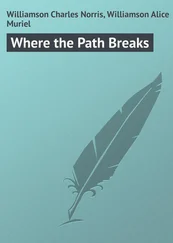Charles Williamson - Lord John in New York
Здесь есть возможность читать онлайн «Charles Williamson - Lord John in New York» — ознакомительный отрывок электронной книги совершенно бесплатно, а после прочтения отрывка купить полную версию. В некоторых случаях можно слушать аудио, скачать через торрент в формате fb2 и присутствует краткое содержание. Жанр: Классический детектив, foreign_detective, foreign_prose, на английском языке. Описание произведения, (предисловие) а так же отзывы посетителей доступны на портале библиотеки ЛибКат.
- Название:Lord John in New York
- Автор:
- Жанр:
- Год:неизвестен
- ISBN:нет данных
- Рейтинг книги:5 / 5. Голосов: 1
-
Избранное:Добавить в избранное
- Отзывы:
-
Ваша оценка:
- 100
- 1
- 2
- 3
- 4
- 5
Lord John in New York: краткое содержание, описание и аннотация
Предлагаем к чтению аннотацию, описание, краткое содержание или предисловие (зависит от того, что написал сам автор книги «Lord John in New York»). Если вы не нашли необходимую информацию о книге — напишите в комментариях, мы постараемся отыскать её.
Lord John in New York — читать онлайн ознакомительный отрывок
Ниже представлен текст книги, разбитый по страницам. Система сохранения места последней прочитанной страницы, позволяет с удобством читать онлайн бесплатно книгу «Lord John in New York», без необходимости каждый раз заново искать на чём Вы остановились. Поставьте закладку, и сможете в любой момент перейти на страницу, на которой закончили чтение.
Интервал:
Закладка:
I groped for an electric switch, touched it, and flooded the vestibule with light. It was small, with nothing to distinguish it from any other vestibule of any other well-furnished flat. Beyond led a narrow corridor which, when lit, showed me several doors. I opened the nearest, switched on another light, and found myself on the threshold of a moderate-sized sitting-room or study, with bookshelves ranged along one of the walls. The window was so heavily curtained that I had no fear of the sudden illumination being noticed from the street. The air was heavy and smelled of moth powder. The mahogany table in the centre of the room and the desk under the window were coated with thin films of dust, but everything was stiffly in order: no books lying about, no woman's work, no trace of cigarette ash, dropped glove, nor pile of newspapers with a tell-tale date.
I walked over to the desk and, pulling out the swivel chair, sat down. In the silver inkstand the ink had dried. In a pen-rack were two pens, one stub, the other an old-fashioned quill, both almost new, but faintly stained with ink. Neither, it struck me, could have been used more than once or twice. There were several small drawers; all were empty. No paper nor envelopes, no sealing-wax nor seal, not so much as an end of twine. But the blotting-pad – the only movable thing on the desk beside the inkstand and pen-rack – was more repaying. It also appeared to be nearly new. Just inside the soft green leather cover lay two sheets of plain, unmonogrammed grey-blue paper with two envelopes to match. I annexed one of the latter and made a mental note that, in the police dossier of the Callender-Graham case the empty envelope found in the pocket of the younger brother was said to be blue-grey in colour and of thick texture. No record had been kept concerning the colour of the envelope in Perry's pocket, as little importance had been attributed to it, until the coincidence of the second envelope was remarked later.
The blotting-pad was as new-looking as the pens. The two uppermost sheets were of unspotted white, but the middle pages had both been used, and traces were visible of two short notes having been pressed against the paper while the ink was still very wet. Apparently these documents had had neither heading nor signature, and consisted of a few lines only. On another page a longer letter began "Dearest," and had been signed with an initial. There was no mirror in the room in which to reverse these writings, and, carefully separating the used sheets from their unsoiled fellows, I folded and slipped them into an inner pocket. There was nothing else in the room which could help me, with the exception, perhaps, of the books; and most of these were in sets, bound in a uniform way. These had a book-plate and the monogram "M.L.," no doubt meaning Maurice Lowenstein. Of new novels or other publications there were none: an additional proof (if it had been needed after the clue of the dried ink and almost unused blotter) that the new tenants were seldom in the place.
Having deduced this fact, I then went through the remaining six rooms of the flat without any discoveries, and finally reached, in its due order, the problem I had left for the last. This was the examination of the lock which the dead brothers' latchkeys had fitted. The work had to be done with the door open, and therefore I waited until the hour when most people lunch. It would look like burglarious business, what I had to do, and it was important not to be interrupted or arrested.
The hands of my watch were at one o'clock as mine were on the latch which, if I were right, could with a single click solve the Callender-Graham mystery. If I were wrong, not only were four out of my twenty-four hours wasted, but my theory fell to the ground and broke into pieces past mending.
I opened the door of the flat and made sure that, for the moment, no one was in the hall. Then, bending down with my back to possible passers-by, I whipped out a magnifying glass and pocket electric torch which I had bought on my way to the agent's.
During the next five minutes I had good cause to thank Heaven for the mechanical bent that had turned my mind to motors and aeroplanes.
The same evening, at a little after six, a "commuter's" train landed me at the station of a small Long Island town almost too far away from New York to be labelled suburban. Big automobiles and small runabouts were there to meet the tired business men who travelled many miles for the sake of salt breezes and the latest thing in Elizabethan houses. I was more tired than any business man; also, I had encountered as many setbacks as successes, but nobody and nothing came to welcome me. I was able, however, to get a place in an old-fashioned horse-drawn vehicle whose mission was to pick up chance arrivals. There were several of us, and as my rate of locomotion was slow, by the time I had hobbled off the platform the one seat left was beside the driver. I was not sorry, as the other men appeared to be strangers in Sandy Plain, and having said I would go to the hotel (for the sake of saying something), I asked my companion if he knew anybody named Paulling.
"There's two families of that name hereabouts," he replied.
"My Paullings," I hazarded, "are retiring people, don't make friends, and are away a good deal."
"Ah, they'd be the Paullings of Bayview Farm!" returned the driver. "There's no others answer that description around here that I ever heard of, and I've lived at Sandy Plain since before the commuters discovered it."
"Yes, I mean the Paullings of Bayview Farm," I caught him up.
"The farm's about a mile and a half past Roselawn Hotel," my seat mate went on. "I can take you there after I drop the other folks."
I thanked him and said he might come back for me if he cared to after I had dined, and inquired casually if the Paullings were staying at their farm just then.
The driver shook his head. He didn't know. Few persons did know much about the Paullings, who weren't old residents, but had rented Bayview Farm two or three years ago. Maybe the hotel folks might be able to tell me whether I was likely to find them.
They could not do so, I soon learned. Mr. Paulling was said to be an invalid, though he never called in the local doctor. He was often at home alone for weeks together, except for a man-servant, a foreigner as reserved as himself, whom he had brought with him to Sandy Plain. There was another servant sometimes – a woman – also a foreigner; but when the Paullings were both away a Mrs. Vandeermans, a country dressmaker who lived in a cottage near by, looked after the house, going in occasionally to see that all was well.
I asked as many questions as I dared, but learned little; and as soon as dusk had begun to fall I started off in the nondescript vehicle which had returned for me. The driver spent most of the twenty minutes it took him to reach the farm in explaining that it wasn't really a farm except in name. Nothing was left of it but the house and two or three acres of orchard; all the rest had been sold off in lots by the owner before he let it to the Paullings. What "city folks" admired in it was beyond the knowledge of my companion, but when we arrived at the gate and saw the far-off house gleaming white behind a thick screen of ancient apple trees, I realised the attractions of the place, especially for such tenants as I believed the Paullings to be. The farm-house, with its wide clapboarding, its neat green shutters, and its almost classic "colonial" porch hung with roses, had the air of being on terms of long familiar friendship with the old-fashioned garden and the great trees which almost hid it from its neighbours and the road. Its front windows, closed and shuttered now, would look out when open over sloping lawns and flowerbeds to distant blue glints of the sea; and altogether Bayview Farm seemed an ideal retreat for persons who could be sufficient to themselves and each other.
Читать дальшеИнтервал:
Закладка:
Похожие книги на «Lord John in New York»
Представляем Вашему вниманию похожие книги на «Lord John in New York» списком для выбора. Мы отобрали схожую по названию и смыслу литературу в надежде предоставить читателям больше вариантов отыскать новые, интересные, ещё непрочитанные произведения.
Обсуждение, отзывы о книге «Lord John in New York» и просто собственные мнения читателей. Оставьте ваши комментарии, напишите, что Вы думаете о произведении, его смысле или главных героях. Укажите что конкретно понравилось, а что нет, и почему Вы так считаете.












